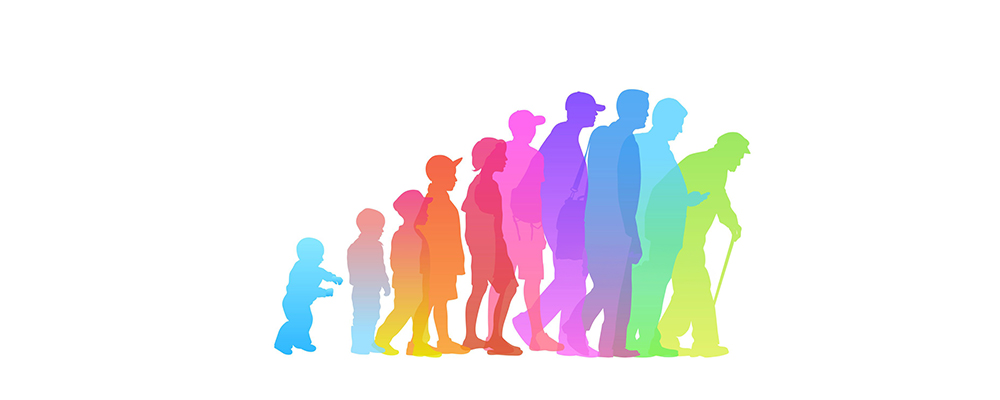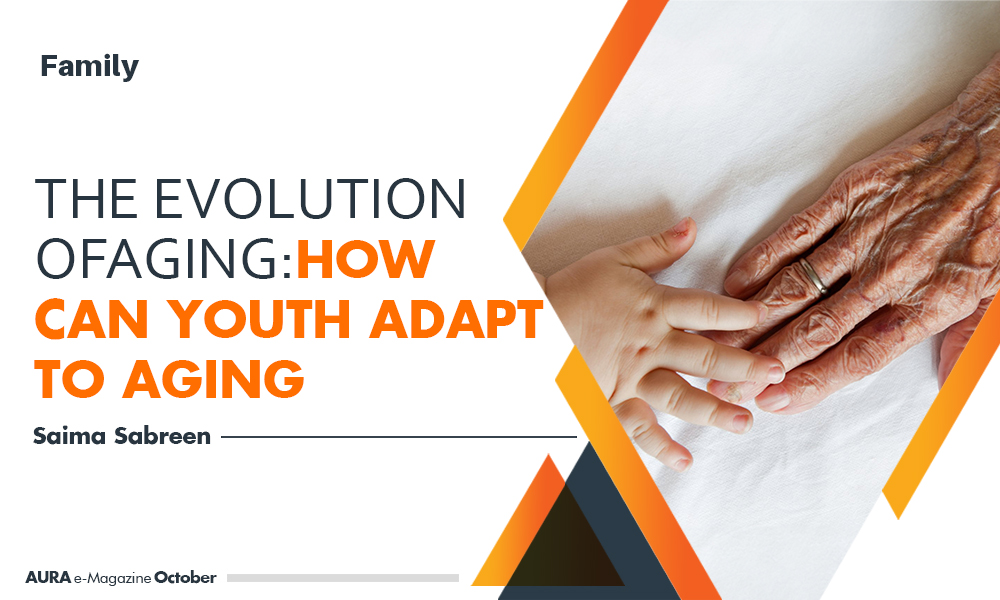Baba, you haven’t taken your blood pressure medication today’ ‘Nani, why are you being so adamant about getting a blood test done?’ ‘Ammi, don’t you understand that if you don’t take your insulin / diabetic medications on time, it is going to be harmful to you?’. These are a few examples of concerns that young adults often have about their parents or elderly relatives. But have we ever considered whether ageing is solely about developing medical issues? Are there other changes that people experience as they grow older? Does their way of thinking or perspective shift over the years? As their children or relatives, do we have a responsibility beyond just looking after their physical health?
We’ve all experienced that phase in life where we notice our elders changing. Who they were in the past seems quite different from who they have become. As the younger generation, it can be frustrating when the rules and principles strictly applied to us differ from those they apply to their grandchildren. Or when they criticise how we raise our children despite having raised us with even stricter methods. These and similar issues often create tension between us and our parents or elderly relatives, leading to friction between relationships. Our responsibility begins with understanding that elders change as they age, affecting their perspective and approach to life. The first step in adapting to our ageing elders is to recognise and acknowledge these changes they are experiencing.
Every person has a unique personality, and during youth, expressing individuality, having one’s own opinion, and voicing it confidently are highly valued traits. However, as people age, they may feel their individuality is fading. They feel joy and pride watching their children, who were once in their arms, now standing up for themselves and articulating their viewpoints. Yet, when their thoughts and beliefs conflict with those of the younger generation, they can feel powerless and marginalised. They may think their influence is slipping away, and their once decisive opinions are now ignored or dismissed. At this point, we need to empathise with them and try to see things from their perspective. There is no harm in listening to their views—it can make them feel valued rather than excluded. Just as parents listen patiently to a baby babbling, “Da…da…ki…ki…boo…boo,” even if they don’t understand the words, we need also to take that little extra time to listen to our elders. Often, not listening can lead to misunderstandings and conflict within the family. While it may not always be practical to follow their advice word for word, since circumstances and times change, elders often seek simply to be heard. Instead of responding with, ‘This is our matter, and we know how to handle it’, giving them the sense that their opinions are valued can make them feel empowered and appreciated.
The Effects of Ageing
As our elders grow older, they often become more irritable, get upset over small things, tend to feel more hurt and point out mistakes in whatever we do, no matter how much effort we put in to do our best for them. As younger people, it can be challenging for us to accept this, especially when we believe we are doing everything right based on our understanding. However, it is important to realise that, regardless of age, elders often feel they must correct and guide the younger generation. In such situations, responding with frustration or annoyance only worsens the problem. Even when we feel confident we are right, sometimes it is better to listen to them and nod in agreement. It is essential to recognise that their intent is not always to find faults but to feel acknowledged and respected for their authority. This behaviour is often their way of asserting their position as elders and reminding us of the respect they deserve.
Often, just saying a sincere “Sorry” can make a huge difference when dealing with them. When they point out mistakes or express their anger—mistakes that may not seem like mistakes to us—taking a humble step forward and saying, ‘I understand your concern, and I will try my best to be more careful in the future’ can quickly diffuse the situation. In most cases, this simple gesture can help them return to their usual selves, often forgetting the issue. As John C. Maxwell wisely said, ‘All you have to do is care about people and initiate’. Showing care and understanding can go a long way in maintaining harmony and showing respect to our elders.
Another common issue that young people often face with their parents or elderly relatives is their tendency to decline offers, such as having tea or coffee or going out somewhere, only to complain later that no one takes care of them. This behaviour can be seen as a way for elders to seek attention, like a small child who cries or shouts to draw people close. As people grow older and gain more life experience, they often recognise that their children, who are now adults, have busy and demanding lives. They may think they are easing their children’s burden by not asking for attention or time. However, deep down, they truly desire to feel wanted, needed, and appreciated by their children. They long for their children to insist on spending time with them, as it makes them feel more loved and valued. Small gestures or moments of perceived neglect can hurt them more deeply, causing a surge of emotions. Considering their feelings and emotions, they expect the conversations to be even more emotional and deep. A common observation is how fathers, who were once stern, always busy, and rarely showed vulnerability, become more emotional and teary-eyed as they age. While this may not be true for everyone, it illustrates how ageing can make elders more sensitive and emotional. This feeling of loneliness often intensifies when one partner passes away, leaving the surviving elder feeling even more isolated.

Small Gestures
For younger people, balancing time between their immediate family, children, and elderly parents or relatives can be challenging. However, small acts of kindness can greatly make older people feel valued and included. Taking a moment to say hello or offer a warm greeting before leaving the house, spending a few minutes in their room to chat and ask about their well-being, or bringing them a small treat they have always enjoyed—these small gestures can prevent them from feeling neglected or forgotten. Sometimes, even a simple smile or a loving glance can have a profound effect. A look that says, ‘You are a blessing in my life, and I am truly grateful to the Almighty for having you’ can work wonders in making them feel cherished and appreciated. Prophet Muhammed ﷺ has even taught this. The Messenger of Allah ﷺ is reported to have said: “Every righteous child who casts a look of mercy and affection upon his parents shall be granted, for every look of his, rewards equivalent to that of an accepted Hajj”. Those around the Prophet questioned: “O Prophet of Allah! Even if he were to look at them a hundred times a day?” The Messenger of Allah ﷺ replied: “Indeed! Allah is the Greatest and Most Kind”.
In addition, we often observe that elders do not openly express their needs and desires. This is similar to how we may have felt as children when we longed for a particular ice cream or chocolate but did not voice it to our parents. Yet, when our parents surprised us with these treats, we felt an overwhelming joy, as if we were on cloud nine. For many years, our elders have provided for us, but as they grow older, they hope to meet their needs without asking. It is as if the roles have reversed. Sometimes, elders wish for more than just the basics like their medications; they want us to notice the small things, like saying, ‘Dad, you’ve been wearing the same shirt for quite some time. Let’s go and get a new one, I insist. It will make me happier. Even in these moments, they might respond, ‘I don’t need anything. You’ve already done so much for me. However, beneath these words, they may feel overlooked when they observe their younger family members showing care and attention to others while neglecting them. Even though they may have declined offers of help or new things, they still desire to meet their basic needs without expressing them directly. Just taking a small step can help in fulfilling this need of theirs.
This highlights that adjusting to our elders’ ageing is not easy. Sometimes, we are simply exhausted, and making that extra effort feels difficult and nearly impossible. Such moments of weakness might help us close our eyes and imagine that 15 to 30 years from now, we may find ourselves in a similar situation. Yet, being young and energetic, we often convince ourselves, ‘We would never be like them; we will be different’. It’s crucial to remember that every elder likely felt the same way during their youth. Denying or ignoring this reality does no good. Instead, accepting the truth and learning to adapt and adjust will benefit us and our elders. As Idowu Koyenikan aptly put it, ‘There are certain life lessons that you can only learn in the struggle’. While we struggle to understand our elders, we learn a lot.
Conclusion
So, let us love our elders for who they were and who they have become. Let us start interpreting every action of theirs as an expression of love. Just as we look at our little children with nothing but affection no matter what they do, why not adopt the same attitude when interacting with older people? Let us embrace every change they are going through, every thought they have, and every evolving perspective. By doing so, we can show them genuine, selfless love. Let us become the first ones to change rather than expecting others to change. Be the change and let the others follow.


Very nice article.. it looks like the writer has researched a lot 5p know the feelings of elders
Much needed reminder. Nicely written. Jazakum Allahu khaira.